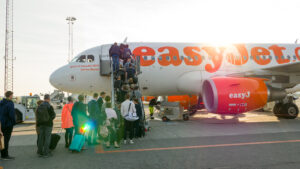EasyJet bumps up its ticket prices by 20 per cent as losses soar to £2bn


EasyJet is to increase fares by more than 20 per cent and even higher at peak Christmas holiday times as the airline attempts to claw back losses totalling more than £2 billion.
The bid to repair the fortunes of Britain’s busiest short-haul airline and avoid big seasonal losses will mean easyJet flying 17 per cent fewer seats this winter and 11 per cent fewer as a whole for its financial year through to next September.
While the airline expects to return to profitability next year, at this stage forecasts are for about £250 million, which is less than half that reported before the pandemic. The uncertainty surrounding the fortunes of the airline industry in general during this winter’s expected recession in the UK and Europe, and the impact on easyJet in particular, sent the stock lower again in trading yesterday.
After a four-week, 40 per cent rally from a ten-year low of 285p last month, the shares fell 2.6 per cent, or 10¼p, yesterday to close at 383p.
The pan-European airline, which does half its business in and out of the UK, reported a summer trading quarter better than any other in its 27-year history with profits of £674 million. But after a heavily lossmaking winter last year and a chaotic post-pandemic restart to business last spring hampered by staff shortages, easyJet still managed to make losses in its financial year to the end of September of £178 million.
Analysts believe that a recovery to profitability will be slow, with profits of no more than £250 million in its current financial year. That is in stark contrast to Ryanair, its big rival in the European short-haul market, which is on track to report profits back above £1 billion.
EasyJet expects to fly 94 million seats this year on which it might reasonably expect to carry 85 million passengers, down 11 per cent on pre-pandemic levels. For comparison, next year Ryanair expects to carry 186 million passengers, 24 per cent above its pre-pandemic levels.
EasyJet’s capacity, as in the number of seats it will be flying over the next year, as a percentage of its pre-pandemic flying schedule will sequentially be 84 per cent in the current Christmas quarter, 82 per cent in the traditionally slow months of January to March, 93 per cent in the Easter and spring quarter, and 99 per cent in the high summer peak season.
The airline is deliberately targeting near-term capacity at Christmas and new year and the half-term skiing holidays, while paring back its schedules in between.
It reported that with two months gone of this quarter and Christmas holiday season bookings in place, revenues per seat — a reasonable proxy for ticket prices — are on average up 20 per cent on top of the 33 per cent increase over the past year.
Asked if rising fares were sustainable during a cost of living crunch, Johan Lundgren, chief executive, said: “We are seeing strong demand at peak times, and that is reflected in these numbers. But outside the peak we are having to stimulate the market.”
That indicates that with having to cut fares to get people flying during the slow weeks this winter, peak fares are rising well in excess of 20 per cent.
Asked about the City’s forecasts of profitability of just £250 million in the current year, Lundgren, 56, said: “If we were not comfortable [with the forecasts] we would have to say so.
“There is uncertainty around macroeconomic factors and we respect that people need to see more clarity around those factors. But we are making progress on productivity and our transformation of the business, and demand remains strong for people wanting to go on holiday.”
Read more:
EasyJet bumps up its ticket prices by 20 per cent as losses soar to £2bn
